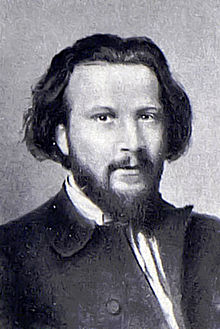Nikolai Dmitrievich Avksentiev
Nikolai Dmitrievich Avksentiev ( Russian Николай Дмитриевич Авксентьев * 16th November 1878 in Penza , † 4. March 1943 in New York City ) was a Russian social revolutionary and politician.
Life
Nikolai, the son of a noble civil servant, graduated from the Penza high school and studied at the Law Faculty of Moscow University . During the student riots anno 1899 he had to leave Russia, studied in Berlin , Leipzig , Heidelberg and Halle on and became in Germany the academic degree of Dr. jur. During the stay in Germany he was together with Goz and Zenzinov in the Heidelberg district of the neo-Kantian and Marxism arrested socialist German-Revolutionaries (SRs) enabled.
After returning to Russia, he was a member of the Social Revolutionaries from 1905 to 1921 and rose to the Central Committee of this Social Democratic party.
In the autumn of 1906 he was arrested. On the occasion of the trial against him, he defended his party's position. The verdict was exile to Siberia . From there, Nikolai Avksentjew managed to flee abroad. In the years of emigration until 1917 he worked in the editorial office of the social revolutionary newspaper Banner der Arbeit (Russian Знамя труда - Snamja truda). As the leader of the right wing of the Social Revolutionaries, he condemned terror as an instrument of war and favored legal means in the fight against the Russian monarchy.
After the February Revolution of 1917 , Nikolai Avksentjew held offices in the Provisional Government . For example, he was Minister of the Interior from August 7th to September 15th, 1917 .
During the October Revolution he fought in the Committee for the Salvation of the Fatherland and the Revolution against the Bolsheviks and was put in the Peter and Paul Fortress for this . Lenin's Justice Minister Steinberg released the prisoner from custody. Nikolai Avksentyev worked at the head of the All-Russian Supreme State Authority , the so-called Ufa Directorate. In the summer of 1918 the resistance of the Social Revolutionaries against the Bolsheviks was formed in Siberia. Nikolai Avksentjew therefore oriented himself further east. As head of the anti-Bolshevik Provisional All-Russian Government (in Russian Временное Всероссийское правительство -. Wremennoje Wserossijskoje prawitelstwo) he was November 18, 1918 along with Argunov, Zenzinov and Rogowski - arrested and two days later unceremoniously into the (Russian Евгений Францевич Роговский Yevgeny Franzevich Rogowski.) Deported abroad.
Nikolai Avksentjew was active in emigre organizations until 1920, acted within the Grand Orient de France as lodge master in the Nordstern (Russian Северная звезда - Severnaya swesda) and published the literary magazine Moderne Blätter in Paris . In 1940 he went to the USA and published the magazine For Freedom (Russian За свободу - Sa swobodu).
Nikolai Avksentiev had a daughter with his wife Berthe - Alexandra.
Works
- 1906 and in the September 1907 issue of the " Russkoje Bogatstwo ": Der Übermensch . Nietzsche's aesthetic ideal (Russian Сверхчеловек. Культурно-эстетический идеал Ницше)
literature
- Leon Trotsky : My life . Attempt an autobiography. Translated from the Russian by Alexandra Ramm . 543 pages. Dietz Verlag, Berlin 1990 (Licensor: S. Fischer, Frankfurt am Main). ISBN 3-320-01574-5
Web links
Individual evidence
- ↑ eng. Andrei Argunov
- ↑ eng. Sovremennye zapiski
- ↑ eng. Alexandra Pregel
annotation
- ↑ A good quarter of a century later, Leon Trotsky remembers the winter of 1903: “Heidelberg was considered the nest of Russian students who belonged to the idealistic school. Among them was Avxentiev, who later became Minister of the Interior under Kerensky . In Heidelberg I broke many a blade in the heated battle over materialistic dialectics. "(Trotsky, p. 140, 5th Zvu, see also First Emigration at MIA )
| personal data | |
|---|---|
| SURNAME | Avksentjew, Nikolai Dmitrievich |
| ALTERNATIVE NAMES | Авксентьев, Николай Дмитриевич (Russian) |
| BRIEF DESCRIPTION | Russian social revolutionary and politician |
| DATE OF BIRTH | November 16, 1878 |
| PLACE OF BIRTH | Penza |
| DATE OF DEATH | March 4, 1943 |
| Place of death | New York City |
